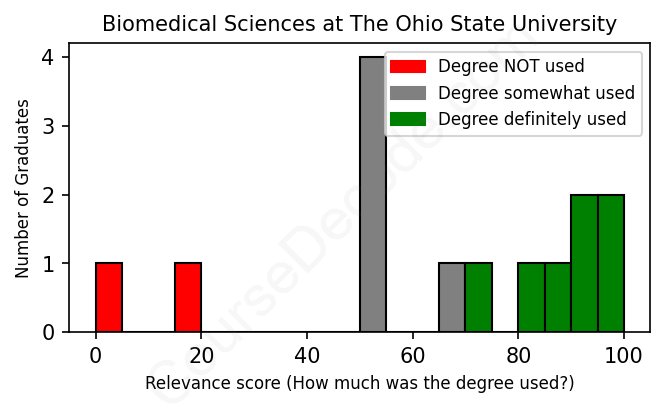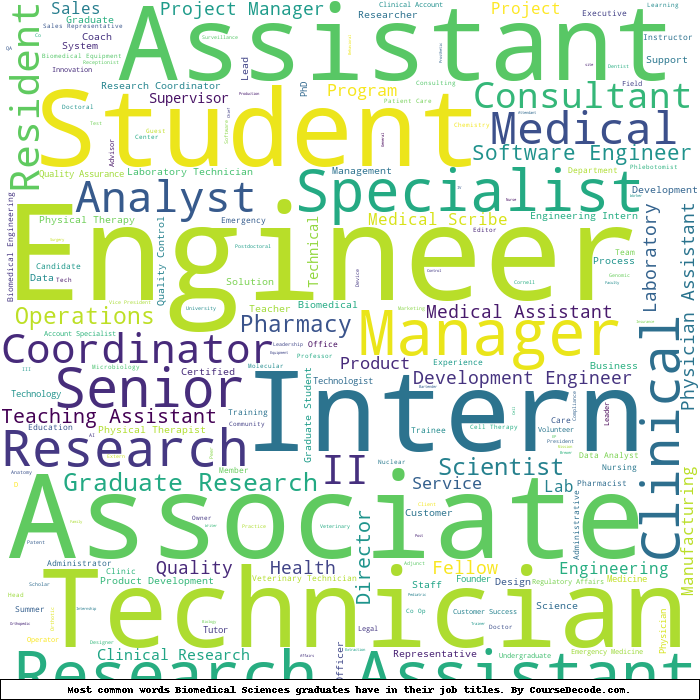
First, some facts. Of the Biomedical Sciences graduates from The Ohio State University we've analyzed , here's how many have used (or NOT used) their degree in their career:

These are estimates based on AI analysis of 14 LinkedIn profiles (see below).
The verdict? Slightly below average. Overall, with an average relevance score of 64%, Biomedical Sciences graduates from The Ohio State University have a slightly lower likelihood (-3%) of finding work in this field compared to the average graduate across all fields:
And for comparison, here's the chart for all profiles we've looked at across all degrees.
Also, after graduating, 57% of these graduates have pursued further education other than another Bachelor's degree (such as a Masters degree or other), compared to the average across all profiles of 35%. This suggests you may need more than just a Bachelors degree to be competitive as a Biomedical Sciences graduate.
See the details:
|
Relevance score: 86% We think this person has gone into a career highly relevant to their degree. We think this person has gone into a career highly relevant to their degree.
DEGREE INFOGraduated in 2014 from The Ohio State University with a Bachelor of Science (B.S.) in Biomedical Sciences. Also pursued further education since (see below). JOB HISTORY SINCE GRADUATIONApplied Neuroscience Intern Wright Patterson May 2015 - Aug 2015 Student Technician IV  UES, Inc Sep 2015 - May 2016 Consultant  UES, Inc May 2016 - Dec 2016 Product Experience/Quality Engineer  Zimmer Biomet - Adecco Feb 2016 - Dec 2017 Research Engineer  Cleveland Clinic Lerner Research Institute Feb 2018 - Dec 2020 Innovation Fellow (Technology Transfer)  Cleveland Clinic Lerner Research Institute May 2021 - May 2023 Senior Research Engineer  Cleveland Clinic Lerner Research Institute Dec 2020 - Present Project Manager  Cleveland Clinic Lerner Research Institute Apr 2023 - Present FURTHER DEGREES DONE SINCE GRADUATINGMasters DegreeThe Ohio State University 2014 - 2015 ABOUTNo information provided. |
The top 10 most common jobs done by the graduates we've analyzed (ranked most common to least) are:
From the LinkedIn profiles I've analyzed, it's clear that many graduates from The Ohio State University with a degree in Biomedical Sciences have pursued careers that vary significantly in relevance to their field of study. A large number of them gravitate towards roles in tech and management, especially in companies like Epic and Veeva Systems, where positions like Solutions Engineer and Product Support Engineer seem to dominate. While some of these roles might require a basic understanding of healthcare technology or data analytics, they often do not delve deeply into the core biomedical sciences knowledge that students acquired during their education.
On the other hand, there are notable exceptions such as positions in research and clinical roles that align closely with biomedical sciences. Jobs like Research Engineer at the Cleveland Clinic or roles related to medical product development highlight the application of relevant biomedical knowledge. It’s a mixed bag overall: while there are pathways that leverage their degree in a meaningful way, many graduates find themselves in roles where the connection to biomedical sciences feels pretty weak. Essentially, it seems that while there are opportunities directly tied to their degree, a significant number of graduates end up in positions that straddle the line between tech and healthcare without fully utilizing their biomedical sciences expertise.
Here is a visual representation of the most common words in job titles for Biomedical Sciences graduates (this is across all Biomedical Sciences graduates we've analyzed, not just those who went to The Ohio State University):

Looking at the career trajectories of graduates from the Biomedical Sciences program at The Ohio State University, it’s clear that many of them have made some interesting career choices, especially in the tech and healthcare sectors. Right after graduation, a lot of them seem to land jobs that are relatively aligned with their degree—positions like technical roles at healthcare software companies (like Epic) or research positions at esteemed institutes (like the Cleveland Clinic). For those who started in roles such as product engineering or technical consulting, it's not uncommon for them to move up the ranks quickly, often securing manager or director positions within a few years. This suggests that the skills they acquired during their studies, combined with the practical experience they gained, really set them on a solid path in their early careers.
Fast forward five to ten years later, many of these graduates continue to stick to fields that relate back to their Biomedical Sciences background. They often transition into more managerial roles, taking on leadership or specialized positions in healthcare settings or innovative tech companies. However, not all graduates seem to maintain a close connection to Biomedical Sciences; some have taken unique paths, like joining the military or veering into product management that potentially doesn’t directly relate to their early studies. Overall, it seems that a degree in Biomedical Sciences from Ohio State can open up several doors in both traditional healthcare and tech industries, but individual experiences vary—some graduates may find more success or relevance to their education than others.
Honestly, a Bachelor’s degree in Biomedical Sciences can be pretty challenging, especially at a big university like Ohio State. You’ll dive into a lot of tough subjects like biology, chemistry, and anatomy, which can be super demanding if you're not into the hard sciences. The coursework is designed to be rigorous, so you’ll need to stay on top of your studies and be ready for some late nights with textbooks and labs. That said, if you have a good study routine and a genuine interest in the field, it can be manageable. Just be prepared for a healthy mix of intense classes, group projects, and hands-on work that might make it feel tougher than your average degree, but it’s definitely doable with some commitment!
Most commonly, in the LinkedIn profiles we've looked at, it takes people 4 years to finish a Bachelor degree in Biomedical Sciences.
So, looking at these Biomedical Sciences grads from Ohio State, it seems like they’re generally doing pretty well money-wise, especially as they progress in their careers. Many of them started strong right after graduation, landing roles at reputable companies like Epic and the Cleveland Clinic, which typically have good pay scales. A few of them have moved up to director-level positions and are involved in things like product management and engineering, which can really boost their salaries. Plus, working in fields like healthcare and tech usually means decent compensation. The US Navy graduates are also in a solid financial position, given the benefits and salary progression in military careers. Even the recent grads are stepping into roles at places like Deloitte, which is a great sign for their earnings potential. So overall, while exact salaries are hard to pin down, it looks like these folks are on track to make some good money!
Here is a visual representation of the most common words seen in the "about" section of LinkedIn profiles who have a Bachelor degree in Biomedical Sciences (this is across all Biomedical Sciences graduates we've analyzed, not just those who went to The Ohio State University). This may or may not be useful:

Here are all colleges offering a Bachelor degree in Biomedical Sciences (ordered by the average relevance score of their Biomedical Sciences graduates, best to worst) where we have analyzed at least 10 of their graduates:
| College | Score | Count |
|---|---|---|
 Western Michigan University Western Michigan University
|
81 | 17 |
 Marquette University Marquette University
|
78 | 29 |
 University of Michigan University of Michigan
|
77 | 10 |
 Colorado State University Colorado State University
|
77 | 19 |
 University at Buffalo University at Buffalo
|
75 | 18 |
 California Polytechnic State University-San Luis Obispo California Polytechnic State University-San Luis Obispo
|
74 | 13 |
 University of Connecticut University of Connecticut
|
74 | 15 |
 Texas A&M University Texas A&M University
|
73 | 59 |
 Auburn University Auburn University
|
71 | 26 |
 Northern Arizona University Northern Arizona University
|
71 | 15 |
 Rensselaer Polytechnic Institute Rensselaer Polytechnic Institute
|
70 | 10 |
 University of Central Florida University of Central Florida
|
69 | 26 |
 University of South Florida University of South Florida
|
68 | 48 |
 Georgia Institute of Technology Georgia Institute of Technology
|
67 | 41 |
 The Ohio State University The Ohio State University
|
64 | 14 |
 Rochester Institute of Technology Rochester Institute of Technology
|
64 | 12 |
 Case Western Reserve University Case Western Reserve University
|
63 | 12 |
 Grand Valley State University Grand Valley State University
|
59 | 35 |
 Arizona State University Arizona State University
|
58 | 12 |